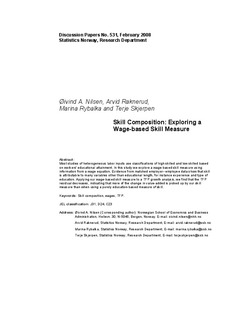| dc.contributor.author | Nilsen, Øivind Anti | |
| dc.contributor.author | Raknerud, Arvid | |
| dc.contributor.author | Rybalka, Marina | |
| dc.contributor.author | Skjerpen, Terje | |
| dc.date.accessioned | 2011-11-07T18:19:26Z | |
| dc.date.available | 2011-11-07T18:19:26Z | |
| dc.date.issued | 2008 | |
| dc.identifier.issn | 1892-753x | |
| dc.identifier.uri | http://hdl.handle.net/11250/180211 | |
| dc.description.abstract | Most studies of heterogeneous labor inputs use classifications of high skilled and low skilled based
on workers' educational attainment. In this study we explore a wage-based skill measure using
information from a wage equation. Evidence from matched employer--employee data show that skill
is attributable to many variables other than educational length, for instance experience and type of
education. Applying our wage-based skill measure to a TFP growth analysis, we find that the TFP
residual decreases, indicating that more of the change in value-added is picked up by our skill
measure than when using a purely education-based measure of skill. Keywords: Skill composition, wages, TFP. | no_NO |
| dc.language.iso | eng | no_NO |
| dc.publisher | Statistics Norway, Research Department | no_NO |
| dc.relation.ispartofseries | Discussion Papers;No. 531 | |
| dc.subject | Skill composition | no_NO |
| dc.subject | Wages | no_NO |
| dc.subject | JEL classification: J31 | no_NO |
| dc.subject | JEL classification: D24 | no_NO |
| dc.subject | JEL classification: C23 | no_NO |
| dc.title | Skill composition: exploring a wage-based skill measure | no_NO |
| dc.type | Working paper | no_NO |
| dc.source.pagenumber | 14 s. | no_NO |
